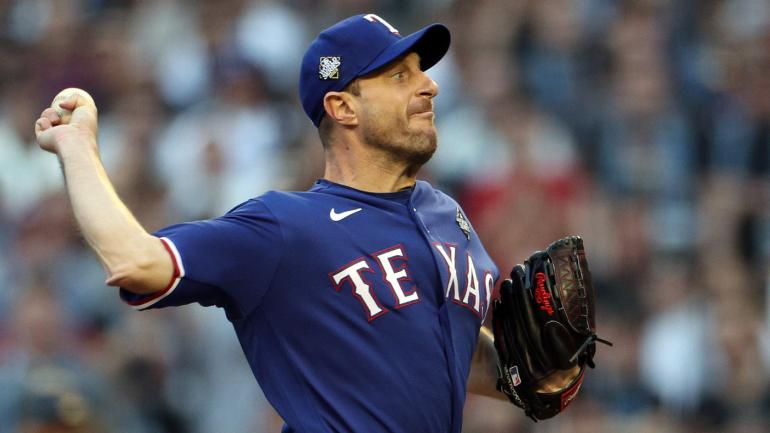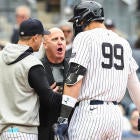
Max Scherzer took a big step toward returning to the Texas Rangers on Wednesday night. The 39-year-old veteran made his first minor league rehab start following offseason back surgery, throwing 52 pitches in 2 1/3 innings at Triple-A. The results were not great -- three runs on five hits, including two homers -- but all that matters at this point is he felt good and made it out in one piece.
"I like where everything is at," Scherzer told the Dallas Morning News. "Physically, I feel good. Especially in that third (inning), getting out there to face the last hitter, I still felt like I had something in the tank to go out there and do that. That's just part of the process of how you build up."
Scherzer said he expects to continue building up to 100 pitches -- "Hopefully next time out I'll get up to 65-70," he told the Dallas Morning News -- indicating he'll make at least one more rehab start before joining the Rangers, and possibly more than that. Point is, the three-time Cy Young winner is trending toward a return sometime next month, which would be ahead of schedule.
Following his rehab start, Scherzer also chimed in on the state of umpiring, and suggested a relegation system for umpires. While saying he believes most umpires are good at their jobs, he proposed a system in which the worst ball-strike umpires are demoted to the minors. Here's what Scherzer said (via the Dallas Morning News):
"We need to rank the umpires," Scherzer said inside a small ballroom at Dell Diamond. "Let the electronic strike zone rank the umpires. We need to have a conversation about the bottom — let's call it 10% — whatever you want to declare the bottom is, and talk about relegating those umpires to the minor leagues."
Scherzer maintained that a large majority of umpires "are really good" but said that there should be a system in place to help improve those on the bottom. There you have it; a solution to one of baseball's high profile issues, all in a day's work.
Hey, there's a relegation system for players, right? The worst performers get sent to the minor leagues. It's survival of the fittest at the highest level. Shouldn't the same apply to umpires? You can understand where Scherzer is coming from here.
Umpires, it must be noted, are evaluated after every game. Their ball-strike calls are compared to the automated strike zone -- the automated zone is used in Triple-A, so Scherzer worked with it during his rehab start -- and, like everything else, some umpires are better at calling balls and strikes than others. Some are better at bang-bang plays at first base, so on and so forth.
These evaluations take place throughout the season and the umpires are given what amounts to a report card at the end of the year. You might get an "A" for this one game, but that doesn't automatically make you an "A" student. You have to keep it up all season. Similarly, one "F" doesn't mean you've failed. You have the rest of the year to improve your score.
One important consideration with a relegation system is whether the top 10% (or whatever the number is) of Triple-A umpires are really better than the bottom 10% of MLB umpires. This is the second straight year with a fully automated strike zone in Triple-A. Some of those umpires might be a little rusty with their strike zone judgment. The grass isn't always greener, you know?
These days, every bad call and every umpire screw up goes viral. When's the last time you saw "wow, the ump was nails behind the plate tonight, he called everything correctly" on your social media feed? Basically never, right? MLB umpires are the best in the world at what they do. Are they perfect? No, of course not. So long as there are umps, there will be complaints. It is what it is.






















